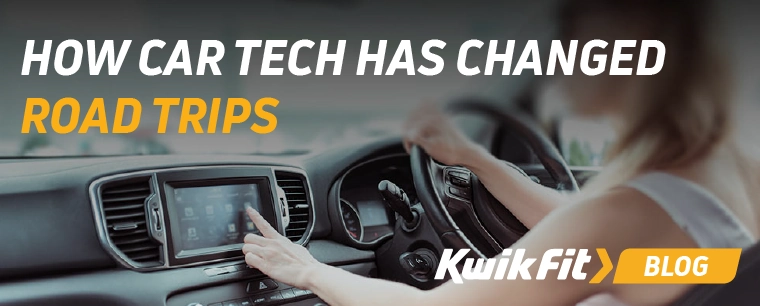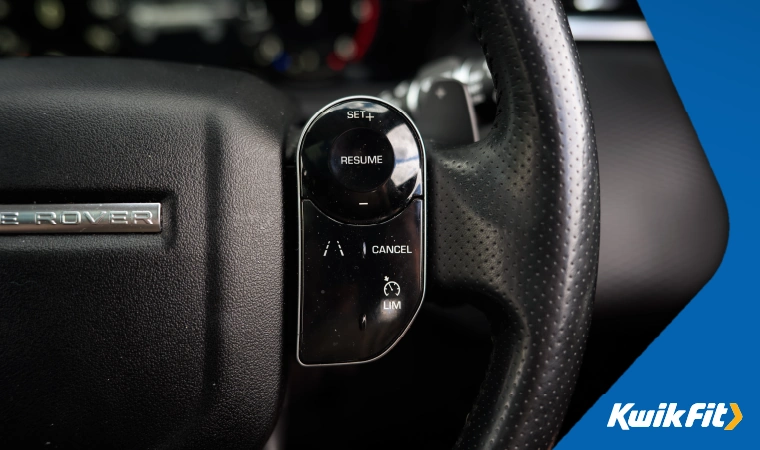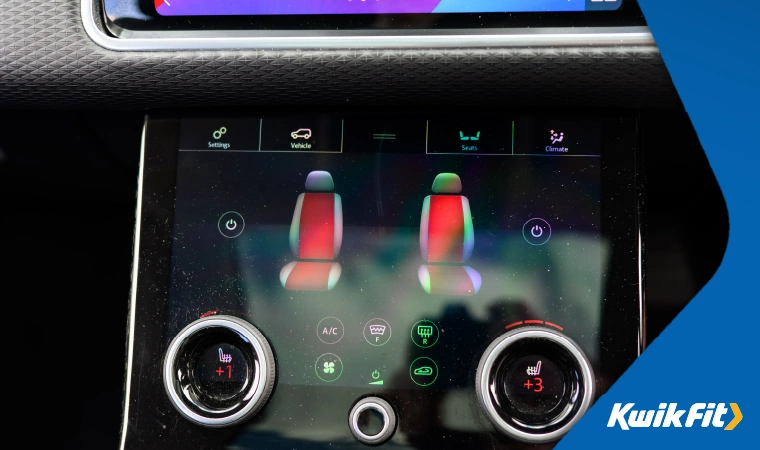How Has Car Tech Changed Road Trips
Jessica Bird | Friday 9th May 2025 9:34am

There’s nothing quite like a road trip. From the Lake District down to the Jurassic Coast and back up again to the Scottish Highlands, the UK has some spectacularly scenic routes just waiting to be explored by car.
But let’s be honest, while road trips are a fun and nostalgic way to explore the UK, they can quickly become quite overwhelming. After all, there are only so many “are we nearly there yet”s that you can put up with on an 8-hour drive. Luckily, modern car technology has completely transformed how we approach long-distance drives. Super-accurate GPS and smart driver assistance are making today’s road trips smoother, safer, and much more enjoyable.
Let’s look in more detail at how car tech has changed the humble road trip over the years.
Modern GPS & live traffic updates
In the “good old days”, a surprising amount of road trip time was spent arguing over huge, unruly maps that wouldn’t ever stay still on the car bonnet. And, after the days of maps, a good chunk of time was spent rifling through whole dossiers of directions printed out from Google Maps. Even early GPS came with its own frustrating quirks – let alone redirecting you down the narrowest lane due to a traffic event that happened the week before. And, while no lane’s too small for adventure in theory, who really wants to drive a family-sized SUV down a 2-mile single-track lane?
Modern GPS, on the other hand, has made driving in general (but road trips in particular) so much more pleasant. Anyone with a smartphone, Google Maps, and enough data can enjoy impressively accurate directions to basically anywhere in the country alongside real-time traffic updates that can redirect you past congested or blocked areas.

Adaptive cruise control & lane assistance
After the first few months of driving, many drivers actually find motorway driving less stressful than normal A-road and B-road driving because motorways are much more predictable. But their relative lack of hazards means that long stretches of motorway can get quite exhausting. The good news is that modern cars come packed with features that make this much easier.
Adaptive cruise control
This clever bit of tech automatically adjusts your speed to keep a safe distance from the car in front, meaning you don’t have to constantly brake and accelerate in stop-start traffic or when tracking behind a car in traffic that’s flowing irregularly. This doesn’t mean you’re able to stop paying attention, but it does save some soreness for your feet!
Lane-keeping assist
Lane-keeping assist is the left & right version of adaptive cruise control. Rather than slowing down or speeding your car up to maintain the flow of traffic, it gently nudges your car back into the lane if you start drifting sideways. Again, it’s not a substitute for paying attention, but is a great additional safety net – especially on long road trips where you could use a helping hand after a couple of hours of driving.

In-car Wi-Fi & smartphone integration for staying connected
Keeping the family entertained on a long trip used to mean endless rounds of “I Spy” and looping through a compilation CD of cheesy 80s classics (some of which, if we’re honest, are still great). But modern in-car Wi-Fi — or even just phone data — means that everyone can stream their favourite shows and doomscroll on the social media platform of their choice, no matter where they are.
And if you want more of an integrated, communal road trip experience, you can usually integrate your smartphone into your car’s entertainment system for a sing-along too.
More comfort on long drives
A less-discussed aspect of the cars of old is just how uncomfortable they were (aside from a few real high-end models). The seat foam would often quickly deteriorate into a hard mass that would leave you and all your passengers squirming for comfort. What’s more, with the unpredictability of British weather, you could be freezing one minute and roasting the next.
But, if you’ll excuse the pun, the road trip experience has come a long way.
Heated & ventilated seats
This tech has quite quickly gone from a half-decent gimmick to a really pleasant addition to modern vehicles. Even as recently as the early 2010s, heated seats tended to provide quite an uncomfortably localised heat, like sitting on two hot wires; but modern heated seats spread that heat much more comfortably and make use of ventilation to make a much more pleasant experience for everyone.

Dual-zone climate control
Even though air con was invented as far back as 1933, it was only in the early 2000s that it became more commonplace in European vehicles. Traditional vehicle climate control took a whole-car approach to either heating or cooling the vehicle — which, of course, led to countless arguments about whether the car was too hot or too cold. Modern dual-zone climate control, however, lets you climate-control the driver-side and passenger-side of the car independently of each other.
360 cameras & blind spot monitoring for safety
As part of broad improvements to ADAS technology, 360 cameras and blind-spot monitoring go a huge way to improving your safety everywhere on the roads. 360 cameras, for example, help you see exactly where your car is in relation to everything else around it through a bird’s-eye view of your car, making it a breeze to manoeuvre into tight parking spots or through narrow lanes.
Likewise, blind-spot monitoring helps you see where you otherwise wouldn’t physically be able to see, which makes it much safer to change lanes (for example, on a motorway). This is especially helpful when the car is packed and you don’t have time, or it’s not safe to try to peep through back passenger windows at potential blind spots.
AI assistants & self-driving technology
While feasible, safe self-driving tech is still probably a little while off, some large leaps have been made with AI tech in motoring. Drivers and regulators are still uncertain about handing over full control to an AI driver, but voice-controlled AI assistants are becoming more sophisticated and it’s likely you’ll soon be able to to seamlessly communicate with your car (and your car’s infotainment system) to update directions, play music, and stop off at key points of interest.
Make sure your car's up to a road trip
While modern car tech has made road trips a whole lot more pleasant, there are few things worse than getting 10 miles onto your road trip and then spending the rest of the day at the side of the road waiting for assistance after a breakdown. Investing in regular (half-yearly or yearly) maintenance and servicing is by far the best way to avoid any unexpected mishaps and make sure your car’s always ready to go for the next adventure.
Get in touch with the experts at your local Kwik Fit centre for dependable servicing and efficient repairs to make sure your next road trip’s a smooth one!
Any facts, figures and prices shown in our blog articles are correct at time of publication.
Featured Articles
Is it Illegal to Drive With One Headlight?
Saturday 19th July 2025
Wondering if it’s illegal to drive with one headlight? Learn about the safety risks and penalties of illegal blown bulbs and why you should fix them promptly.
Air Con in EVs & Hybrids: Experts Answer Your Questions
Monday 30th June 2025
Does air con drain EV batteries? Can you use the air con while charging an electric car? Find out the answers to these questions & more from Kwik Fit’s experts.
Why Is Your Car Making a Noise? Fixes & Tips
Friday 13th June 2025
When your car starts making unexpected noises, it can certainly be quite disconcerting; it may be nothing to worry about, but here’s what you need to know.









